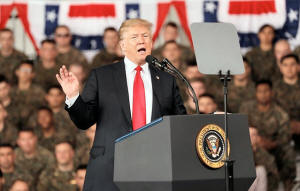|
Trump eyes tariffs on up to $60 billion
Chinese goods; tech, telecoms, apparel targeted
 Send a link to a friend
Send a link to a friend
 [March 14, 2018]
By David Lawder and Michael Martina [March 14, 2018]
By David Lawder and Michael Martina
WASHINGTON/BEIJING (Reuters) - U.S.
President Donald Trump is seeking to impose tariffs on up to $60 billion
of Chinese imports and will target the technology and telecommunications
sectors, two people who had discussed the issue with the Trump
administration said on Tuesday.
A third source who had direct knowledge of the administration's thinking
said the tariffs, associated with a "Section 301" intellectual property
investigation, under the 1974 U.S. Trade Act begun in August last year,
could come "in the very near future."
While the tariffs would be chiefly targeted at information technology,
consumer electronics and telecoms, they could be much broader and the
list could eventually run to 100 products, this person said.
The White House declined to comment on the size or timing of any move.
In Beijing, Chinese foreign ministry spokesman Lu Kang said Sino-U.S.
trade relations should not be a zero-sum game, and that the two
countries should use "constructive" means to manage tension.

"We have said many times that China resolutely opposes any kind of
unilateral protectionist trade measures," Lu told reporters.
"If the United States takes actions that harm China's interests, China
will have to take measures to firmly protect our legitimate rights."
Trump is targeting Chinese high technology companies to punish China for
its investment policies that effectively force U.S. companies to give up
their technology secrets in exchange for being allowed to operate in the
country, as well as for other IP practices Washington considers unfair.
The Trump administration is also considering imposing investment
restrictions on Chinese companies over and above the heightened national
security restrictions, but details on these were not immediately known.
A U.S. Treasury spokeswoman did not immediately respond to requests for
comment.
But lobbyists in Washington expressed concern that Trump's ambitious
tariff plan would also include other labor-intensive consumer goods
sectors such as apparel, footwear and toys.
Higher tariffs on these products would "hurt American families," said
Hun Quach, a trade lobbyist for the Retail Industry Leaders Association.
"We're not talking about fancy cashmere sweaters, we're talking about
cotton T-Shirts and jeans and shoes that kids wear for back-to-school,"
she added. "Alarm bells are ringing."
China runs a $375 billion trade surplus with the United States and when
President Xi Jinping's top economic adviser visited Washington recently,
the administration pressed him to come up with a way of reducing that
number.

Trump came to office on a promise to shield American workers from
imports and his first action as president was to pull the United States
out of the 12-country Trans-Pacific Partnership trade deal.
His administration is in the midst of negotiations to revamp the North
American Free Trade Agreement (NAFTA) and last week announced the
imposition of tariffs on steel and aluminum imports.
While the tariffs on steel and aluminum, announced last week by Trump,
are viewed as relatively insignificant in terms of imports and exports,
moves to target China directly risk a direct and harsh response from
Beijing.
"If this is serious, the Chinese will retaliate. The key question is,
does the U.S. retaliate against that retaliation," said Derek Scissors,
a China trade expert at the American Enterprise Institute, a
pro-business think tank.
That would spook stock markets, but Scissors said that the more serious
the conflict became, the worse China's position would become, due to the
importance of its U.S. trade surplus.
[to top of second column]
|

President Donald Trump speaks at Marine Corps Air Station Miramar in
San Diego, California, U.S. March 13, 2018. REUTERS/Kevin Lamarque

"Their incentive to negotiate is to head us off from a major trade
conflict."
NOT BIG ENOUGH
The news website Politico earlier reported that the U.S. Trade
Representative's office had presented Trump with a package of $30
billion in tariffs last week, but Trump told aides that this was not
high enough.
One Washington business source who had discussed the issue with the
White House said the figure had now grown to about $60 billion, with
a potentially wider array of products under consideration.
A second person, who is an industry lobbyist in Washington familiar
with the administration's thinking, said the process was being led
by Peter Navarro, an avowed protectionist, and by U.S. Trade
Representative Robert Lighthizer, who also favors tariffs as a tool
to rebalance trade.
Speaking to reporters in the Capitol, U.S. House Ways and Means
Committee Chairman Kevin Brady stressed that Trump was serious about
addressing the issue of intellectual property theft with China.
"He's serious about calling their hand on this, and my understanding
is they are looking at a broad array of options to do that," Brady
said.
U.S. business groups, while uneasy about triggering Chinese
retaliation, have increasingly pressed Washington to take action on
Beijing's industrial policies, such as market access restrictions
and the "Made in China 2025" plan, which aims to supplant foreign
technologies with domestic ones.

Shortly after Trump took office, the Information Technology &
Innovation Foundation (ITIF), a U.S. technology think tank whose
board includes representatives from top companies such as Apple,
Amazon, Cisco, Google, and Intel, called for coordinated
international pressure on Beijing.
While complaints about China's abuse of intellectual property rights
are not confined to the United States, Trump's global steel and
aluminum tariffs announced last week under section 232 of the Trade
Expansion Act of 1962 complicate U.S. efforts to recruit allies to
put pressure on China.
A senior European diplomat in Beijing said China would be relieved
to see Europe and Washington at odds over the metals tariffs.
"China's biggest worry has always been joint push-back from its
major Western trading partners," the diplomat said.
A China-based business source with knowledge of discussion among
senior European officials said there had been a "clear effort" by
the U.S. government over the past six months to introduce a
coordinated approach to Chinese industrial policy, but that Trump's
metals tariffs had undermined European support.
"Senior Trump administration officials had directly approached
European leaders at a senior level. There had been a willingness to
do something together on China. That's impossible right now. You
can't cooperate when you're getting whacked around," the person told
Reuters.
(Additional reporting by Ginger Gibson and Roberta Rampton, and
Christian Shepherd in BEIJING; Writing by David Chance; Editing by
Clive McKeef, Peter Cooney and Clarence Fernandez)
[© 2018 Thomson Reuters. All rights
reserved.]
Copyright 2018 Reuters. All rights reserved. This material may not be published,
broadcast, rewritten or redistributed.
Thompson Reuters is solely responsible for this content.
 |